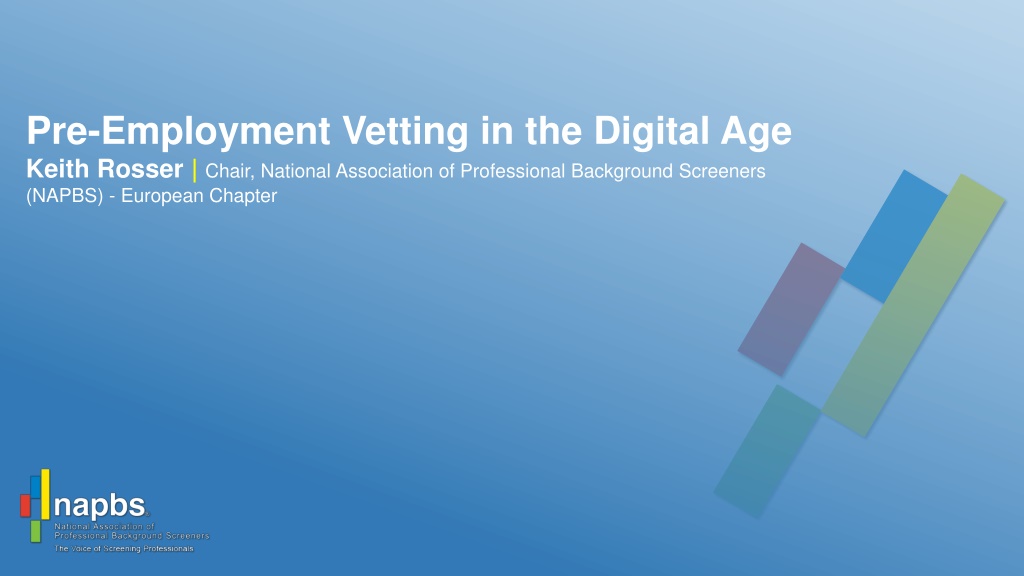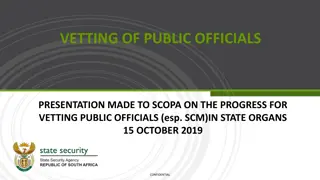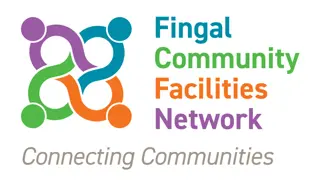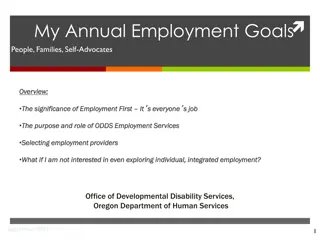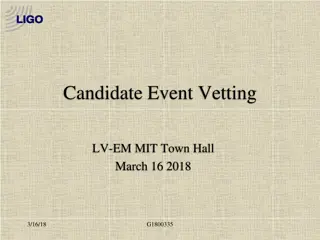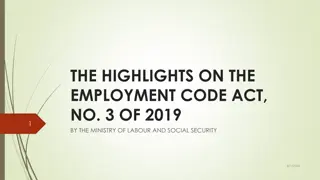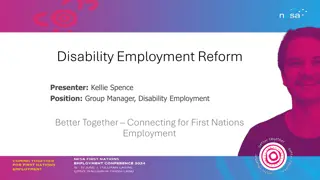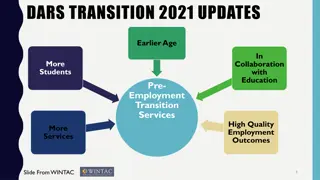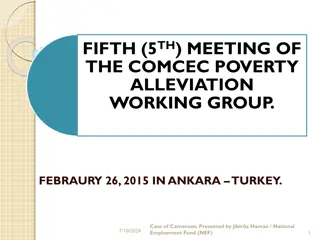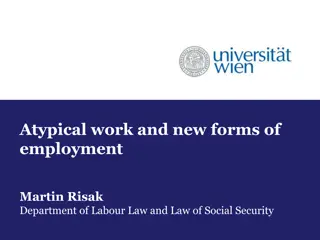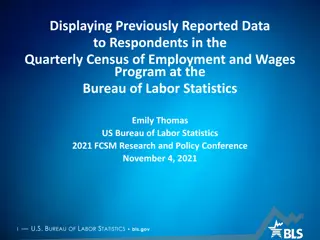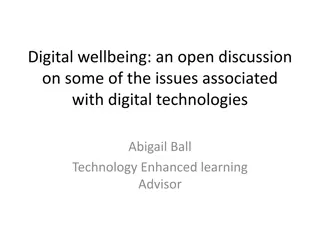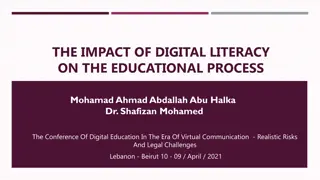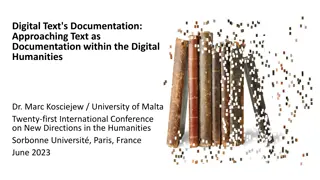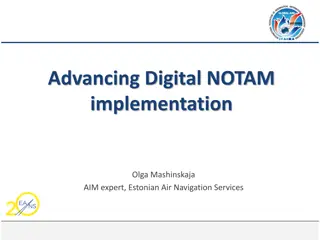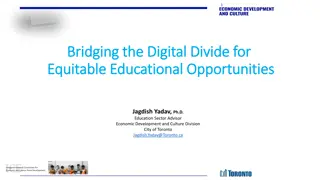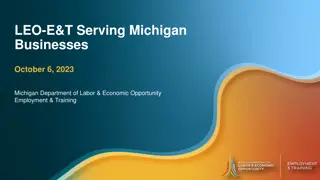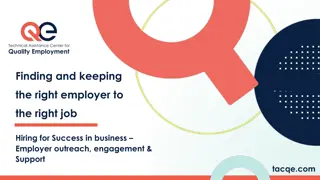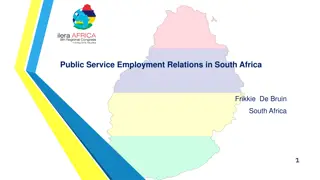Evolution of Pre-Employment Vetting in the Digital Age
Explore the changing landscapes of crime, life, and work in the digital era through insights from Keith Rosser, Chair of NAPBS - European Chapter. Learn about the dehumanized nature of online crime, the rise of digital fraud, and the impact on candidate experiences in a rapidly evolving workplace. Gain valuable perspectives on the future of vetting and the prevalence of digital versus physical crime in society today.
Download Presentation

Please find below an Image/Link to download the presentation.
The content on the website is provided AS IS for your information and personal use only. It may not be sold, licensed, or shared on other websites without obtaining consent from the author. Download presentation by click this link. If you encounter any issues during the download, it is possible that the publisher has removed the file from their server.
E N D
Presentation Transcript
Pre-Employment Vetting in the Digital Age Keith Rosser | Chair, National Association of Professional Background Screeners (NAPBS) - European Chapter
AGENDA Introduction Landscapes Narratives: Crime Life Work Vetting in the Digital Age Still Human Future of Vetting
INTRODUCTION Director & Founder, Reed Screening 15 years in pre-employment vetting Reed Screening one of the largest vetting business in the UK Chair, NAPBS - Europe Developed a new strategy for the trade body Grown membership by 30% Chair, Criminal Record Trade Body (CRTB) Managed launch of UK s first trade body with the DBS Leading the partnership strategy including digital future Advisory Board, CIFAS UK s leading fraud prevention initiative preventing over 1bn in fraud by 2016 Started in the Credit Industry in 1988 Committee Member, ECHO (Home Office) Advise on current and future right to work legislation Test and pilot latest Home Office policy and systems Chair & Company Director, SAFERjobs Joint GOV UK and law enforcement charity tackling labour market abuse Helped over 2m job seekers and contingent workers
LANDSCAPES Crime Life Work DIGITAL PHYSICAL Crime Life Work Roughly 2.8 million people worked in the gig economy in the last 12 months Majority of crime is now digital, almost half of all crime in the country 1 in 10 people fall victim Online fraud is now the most common crime in the country UK adults now spend more time online each day than sleeping Half of the UK workforce to work remotely by 2020 References: Telegraph 2017, Ofcom 2016, Department for BEIS 2018, OddsMonkey 2017
NARRATIVES Opportunity created by the digital world: Dehumanised nature of crime Majority of crime in future will be online CRIME Choice created by the digital world: Importance of candidate experience Immediacy of demand Raised expectations LIFE Opportunity created by the digital world: Mobility Global workplace More gigs, fewer jobs for life WORK
CRIME Fraud accounted for only 3% of Police recorded crime in 2008 DIGITAL PHYSICAL Fraud & cyber offences now account for approximately 40% of all UK crime Internal fraud committed by employees & management the most common type of fraud to hit businesses Staff fraud costs businesses at least 40 million annually Fraud against businesses was up seven-fold in 2016 80% of CVs analysed in 2017 contained one or more discrepancy, up by 10% on 2016 44% of CV anomalies had lied about their academic background 1 in 4 CVs misleading References: KPMG 2017, Security Watchdog 2018, Risk Advisory Group 2017, Reed Screening 2018, HEDD 2017, Crime survey of England & Wales ONS 2016, Home Office 2009
LIFE In 2005, internet users over the age of 16 claimed to spend 10 hours online each week DIGITAL PHYSICAL By 2014 it had climbed to over 20 hours Our Social Media Selves Over 40 million social media users in the UK Availability of data on our digital life Almost 1/3 of victims of identity fraud had a visible digital footprint on the surface web, mostly on social media More gigs than long term careers 2.8 million people worked in the gig economy in the last 12 months Speed of change 53% of our payments are now made electronically, with contactless payments growing over 228% since 2015 Rise of Blockchain 20% of organizations will have moved beyond pilot projects & will have operationalised it by 2020 References: Ofcom 2015, IDC Health Insights 2017, Careerbuilder 2017, FCA 2016, CIFAS 2018
WORK Only 2.9 million worked from home in 1998 DIGITAL PHYSICAL Half of UK workforce to work remotely by 2020 Severing employee loyalty Rising threat of fraud to employers Changing nature of workforce Global CEO fraud up 2,370% since 2015 IP Fraud Increase in contractor, contingent and freelancer populations Supply chain model and worker relationship References: FBI 2017, ONS 2018, ONS 2014
VETTING IN THE DIGITAL AGE What does vetting need to do to respond? 24/7 Immediacy Candidate Experience Online and Offline Ongoing Vetting Holistic Approach
STILL HUMAN Decision making DIGITAL PHYSICAL Processing Interpreting the vetting data Avoiding blanket bans Understanding social media screening Identifying fraud and trends
FUTURE OF VETTING DIGITAL PHYSICAL APPG on future of digital identity DCMS review of face to face identity checking ECHO review of proposed changes to illegal working regulations Designing a framework for social media screening Launch of the new Criminal Records Trade Body
WORKING WITH AN OUTSOUURCED SUPPLIER NAPBS has 35 European Members Launching an A-Z Resource Site for employers When working with / choosing suppliers consider: 24/7 coverage (speed) SLA commitment and continuous improvement Thought leadership position (value add to you) Innovation roadmap Security credentials and external certification
